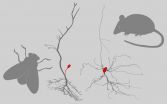Olaparib was licensed in December for women with ovarian cancer and inherited BRCA mutations, but the new research suggests it could also benefit men with genomic faults within their tumours.
Researchers told the American Association of Cancer Research (AACR) conference in Philadelphia that up to 30 per cent of men with advanced prostate cancer had tumours with defects in repairing DNA - and these responded particularly well to olaparib.
The men most likely to benefit could be identified by genetic testing to look for mutations in genes responsible for DNA repair - including the BRCA genes and the gene ATM.
This investigator-initiated phase II trial, called TOPARP-A, was led by researchers at The Institute of Cancer Research, London and The Royal Marsden NHS Foundation Trust, and also involved several other institutions in the UK.
The work was funded by the Prostate Cancer Foundation, Stand Up To Cancer, Cancer Research UK, Prostate Cancer UK and the Movember Foundation, with support from the Investigator-Sponsored Study Collaboration between AstraZeneca and the National Cancer Research Network.
In the trial, researchers monitored the response of 49 men with treatment-resistant, advanced prostate cancer to olaparib. Sixteen patients (32.7 per cent) responded to the drug, as defined by a set of clinical criteria.
Olaparib stopped prostate cancer growth, generating falls in prostate specific antigen (PSA) levels, falls in circulating tumour cell counts in the blood, and radiological responses on CT scans and MRI.
The response rate was much higher in patients whose tumours carried mutations to genes involved in repairing DNA.
Of the 16 patients with detectable DNA repair mutations, 14 responded to olaparib - accounting for the large majority of patients who benefited from the drug. Most of these men, who all had terminal prostate cancer with limited treatment options, had disease control lasting much longer than expected in this group of patients.
The development of olaparib, which is now owned by AstraZeneca, was underpinned by research at The Institute of Cancer Research (ICR) and clinical trials at The Royal Marsden, as well as other UK institutions. It has had particularly strong results in phase III trials in patients who inherited mutations to the BRCA genes, many of whom had breast or ovarian cancer.
The results will lead on to the start of TOPARP-B, a second part of the trial in which only men with detectable DNA repair mutations will receive olaparib. If the results of TOPARP-A are replicated in TOPARP-B, olaparib could become a treatment option in advanced prostate cancer.
Trial chief investigator Professor Johann de Bono, Head of Drug Development at The Institute of Cancer Research, London, and The Royal Marsden NHS Foundation Trust, said:
"Our trial shows that olaparib is effective in men with defects in DNA repair genes who do not necessarily have an inherited risk of cancer - and that we can pick up these defects in the clinic. This opens up the exciting possibility of delivering precise treatment for advanced prostate cancer, guided by genomic testing and based on the particular molecular characteristics of patients' tumours.
"The trial is also exciting because it shows that PARP inhibitors can be effective in a wider group of patients than had been thought - in men as well as women, patients with mutations in their tumours as well as those with inherited mutations, and in those with a wider range of gene defects than just BRCA mutations."
Dr Emma Hall, Deputy Director of the Cancer Research UK-funded Clinical Trials and Statistics Unit at The Institute of Cancer Research, London (ICR-CTSU),,, said:
"In recent years we've seen a significant improvement in the length of good-quality life men can hope to live even with the most advanced prostate cancers - thanks to clinical trials giving us several new prostate cancer drugs. These encouraging results show that olaparib could be the next drug to add to those already available. "We are really excited to now be moving forward with the next phase of our trial, which will be a key step in the evaluation of olaparib in advanced prostate cancer."
Dr William G Nelson, Co-chair of Stand Up To Cancer and Scientific Advisory Director of the Sidney Kimmel Comprehensive Cancer Center in Baltimore, US, said:
"This is the first study to test the promise of a new kind of drug, olaparib, for life-threatening prostate cancer no longer responding to best available treatment. The results are extremely encouraging, suggesting that men with prostate cancers that contain defective DNA repair genes may benefit from olaparib treatment."
Professor Steve Jackson, Head of Cancer Research UK Laboratories at the University of Cambridge Gurdon Institute - whose CRUK-funded research led him to establish and scientifically lead the company KuDOS, which developed olaparib - said:
"The results from this innovative clinical trial are very promising and highlight the potential for olaparib - and other PARP inhibitors - to treat a wide range of cancers. If these new results are confirmed by further patient trials, they could soon pave the way for a much needed new treatment for late-stage prostate cancer."
INFORMATION:
Notes to editors
For more information contact Henry French on 020 7153 5582 / henry.french@icr.ac.uk. For enquiries out of hours, please call 07595 963 613.
The Institute of Cancer Research, London, is one of the world's most influential cancer research institutes.
Scientists and clinicians at The Institute of Cancer Research (ICR) are working every day to make a real impact on cancer patients' lives. Through its unique partnership with The Royal Marsden NHS Foundation Trust and 'bench-to-bedside' approach, the ICR is able to create and deliver results in a way that other institutions cannot. Together the two organisations are rated in the top four cancer centres globally.
The ICR has an outstanding record of achievement dating back more than 100 years. It provided the first convincing evidence that DNA damage is the basic cause of cancer, laying the foundation for the now universally accepted idea that cancer is a genetic disease. Today it leads the world at isolating cancer-related genes and discovering new targeted drugs for personalised cancer treatment.
As a college of the University of London, the ICR provides postgraduate higher education of international distinction. It has charitable status and relies on support from partner organisations, charities and the general public.
The ICR's mission is to make the discoveries that defeat cancer. For more information visit http://www.icr.ac.uk
The Royal Marsden NHS Foundation Trust
The Royal Marsden opened its doors in 1851 as the world's first hospital dedicated to cancer diagnosis, treatment, research and education.
Today, together with its academic partner, The Institute of Cancer Research (ICR), it is the largest and most comprehensive cancer centre in Europe treating over 50,000 NHS and private patients every year. It is a centre of excellence with an international reputation for groundbreaking research and pioneering the very latest in cancer treatments and technologies.
The Royal Marsden, with the ICR, is the only National Institute for Health Research Biomedical Research Centre for Cancer. First awarded the status in 2006, it was re-awarded in 2011. A total of £62 million is being provided over five years, to support pioneering research work, and is being shared out over eight different cancer themes.
The Royal Marsden also provides community services in the London boroughs of Sutton and Merton and in June 2010, along with the ICR, the Trust launched a new academic partnership with Mount Vernon Cancer Centre in Middlesex.
Since 2004, the hospital's charity, The Royal Marsden Cancer Charity, has helped raise over £100 million to build theatres, diagnostic centres, and drug development units.
Prince William became President of The Royal Marsden in 2007, following a long royal connection with the hospital.


